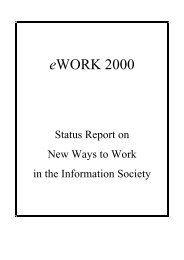Proceedings of 8th European Assembly on telework (Telework2001)
Proceedings of 8th European Assembly on telework (Telework2001)
Proceedings of 8th European Assembly on telework (Telework2001)
Create successful ePaper yourself
Turn your PDF publications into a flip-book with our unique Google optimized e-Paper software.
211How to fi nd work tasks?There is almost no chance to move work to an area just by advertising the possibilities. The chancesmay still be less, if you advertise for employment <str<strong>on</strong>g>of</str<strong>on</strong>g> new <strong>telework</strong>ers. The municipal authoritiesin the northern district decided to go into <str<strong>on</strong>g>of</str<strong>on</strong>g>fensive; they sent two c<strong>on</strong>sultants <str<strong>on</strong>g>of</str<strong>on</strong>g> the local publicadministrati<strong>on</strong> <str<strong>on</strong>g>of</str<strong>on</strong>g> trade and industry to Oslo. The Oslo <str<strong>on</strong>g>of</str<strong>on</strong>g>fice <str<strong>on</strong>g>of</str<strong>on</strong>g> the municipality was established,and the missi<strong>on</strong> <str<strong>on</strong>g>of</str<strong>on</strong>g> this <str<strong>on</strong>g>of</str<strong>on</strong>g>fice was to sell the district and its competence in informati<strong>on</strong> systemstechnology to enterprises, governmental instituti<strong>on</strong>s, and politicians. The Norwegian Governmenthad as its policy that there should be no further expansi<strong>on</strong> <str<strong>on</strong>g>of</str<strong>on</strong>g> governmental instituti<strong>on</strong>s in Oslo.Any growth should be based <strong>on</strong> moving tasks out to other districts. Telework was menti<strong>on</strong>ed as apossibility in that c<strong>on</strong>necti<strong>on</strong>.The c<strong>on</strong>sultants had prepared a good presentati<strong>on</strong> <str<strong>on</strong>g>of</str<strong>on</strong>g> the district c<strong>on</strong>taining arguments regardingec<strong>on</strong>omical benefits and the ability and competence <str<strong>on</strong>g>of</str<strong>on</strong>g> the local work force. The material alsopresented <strong>telework</strong> as a good way <str<strong>on</strong>g>of</str<strong>on</strong>g> organising work.The c<strong>on</strong>sultants first started their sales job focusing <strong>on</strong> the clear policy <str<strong>on</strong>g>of</str<strong>on</strong>g> the government to movework tasks <str<strong>on</strong>g>of</str<strong>on</strong>g> governmental instituti<strong>on</strong>s out <str<strong>on</strong>g>of</str<strong>on</strong>g> Oslo. They had no success at all. The management<str<strong>on</strong>g>of</str<strong>on</strong>g> the instituti<strong>on</strong>s used all arguments possible against it. After some m<strong>on</strong>ths <str<strong>on</strong>g>of</str<strong>on</strong>g> disappointments,they gave up and turned their sales promoti<strong>on</strong> to the private service industry and media industryin Oslo. They used the job advertisement secti<strong>on</strong>s <str<strong>on</strong>g>of</str<strong>on</strong>g> the newspapers as a guide as to whom theyshould c<strong>on</strong>tact. It brought results and some new perspectives.First <str<strong>on</strong>g>of</str<strong>on</strong>g> all, they experienced that the private industry welcomed the arguments <str<strong>on</strong>g>of</str<strong>on</strong>g> lower costs (taxbenefits and lower wage demands) and possibly more stable workers. Sec<strong>on</strong>dly, they experiencedthat the enterprises did not want to employ people for the jobs so far away. However, the possibility<str<strong>on</strong>g>of</str<strong>on</strong>g> having work tasks moved to the area was felt so positive that they decided to try finding othersoluti<strong>on</strong>s. There were two alternatives both <str<strong>on</strong>g>of</str<strong>on</strong>g> which were used:The local industry could take some <str<strong>on</strong>g>of</str<strong>on</strong>g> the work tasks if they employed <strong>on</strong>e or two more people,but this was limiting the volume <str<strong>on</strong>g>of</str<strong>on</strong>g> each case. The Oslo enterprises planned for a growth <str<strong>on</strong>g>of</str<strong>on</strong>g> 10-20workers for the tasks. The other possibility was to start a new company that could partially employsome people and partially organize the work by giving out work to free agents and the localindustry. This company was now to be established.After 16 m<strong>on</strong>ths in Oslo, the result is that about 20 jobs have been created in the district, employingmainly people who live in the area. Until now, it has not been registered that any<strong>on</strong>e would havemoved to the area to take some <str<strong>on</strong>g>of</str<strong>on</strong>g> the new jobs. The real number <str<strong>on</strong>g>of</str<strong>on</strong>g> jobs created is much highersince 80 new jobs were also created in the neighbouring district. These were mainly call-centrejobs, and the employer found that for these types <str<strong>on</strong>g>of</str<strong>on</strong>g> jobs it was necessary to have a local labourmarket with a c<strong>on</strong>tinuous supply <str<strong>on</strong>g>of</str<strong>on</strong>g> new employees. The reas<strong>on</strong> is that these types <str<strong>on</strong>g>of</str<strong>on</strong>g> jobs fit shorttermemployees best. They therefore found it more suitable to establish the service in a more townlikeplace, which also has the educati<strong>on</strong> centre <str<strong>on</strong>g>of</str<strong>on</strong>g> the county. There the labour market also c<strong>on</strong>sisted<str<strong>on</strong>g>of</str<strong>on</strong>g> students who would take this type <str<strong>on</strong>g>of</str<strong>on</strong>g> a job.








